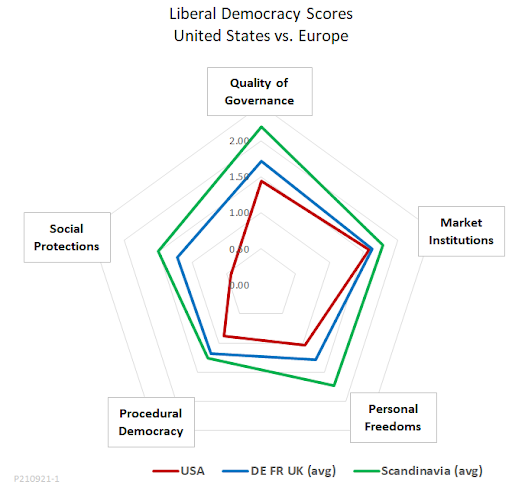In a recent New York Times op-ed, Harvard professor N. Gregory Mankiw asks, “Can America Afford to Become a Major Social Welfare State?” By welfare state, he has in mind the Biden administration’s plan for better child benefits, improved healthcare, extending free public education to preschool and community college, and the rest.
From a “narrow budgetary standpoint,” Mankiw agrees that these things are affordable. But he is concerned about the larger question of whether stronger social protections are consistent with prosperity and with our aspirations for the “kind of nation we want to be.” Let’s take each of those in turn.
Prosperity, for Mankiw, means GDP. Yes, America has lots of that. He points out that as of 2019, GDP per capita was 14 percent lower in Germany than in the United States, 24 percent lower in France, and 26 percent lower in the United Kingdom.
But GDP per capita has its limits as a measure of prosperity. It is, after all, an average whose numerator lumps together the incomes of billionaires and the incomes of the poor. True, the United States does pretty well in the billionaire sweepstakes. It has 19 percent more billionaires per capita than Germany, 2.7 times as many as the UK, and 3.2 times as many as France. But most people don’t count the “prosperity” of their city or town by the number of billionaires who live there. They are more interested in whether their neighbors, the people they stand in line with at their local supermarkets, can maintain a decent standard of living.
For that, median incomes, not averages, provide a better picture. The median is the income that divides the population right down the middle, with half the people doing better and half not as well. Germany’s median per capita income is just 9 percent lower than the United States, while the UK and France are 20 percent below. The fact that European median incomes are closer to U.S. values than European GDPs reflects that U.S. incomes are more concentrated at top, leaving less for those at the bottom. What is more, the European countries that most people think of first when they hear the term “welfare state” – Norway, Sweden, Denmark, and Finland – all have higher median incomes than we do. How can we talk about prosperity without asking, prosperity for whom?
Let’s turn now to the broader question of the kind of nation we want to be. Since the days of its founding, America has striven to be what political scientists call a liberal democracy. The Oxford English Dictionary defines that as “A democratic system of government in which individual rights and freedoms are officially recognized and protected, and the exercise of political power is limited by the rule of law.”
In my own work, I like to break down liberal democracy into five measurable components (see here for the methodology):
- Quality of governance, including things like rule of law, judicial independence, and government integrity.
- Quality of market institutions, including things like security of property rights, enforcement of contracts, and investor protections.
- Personal freedoms, including those enumerated in the Bill of Rights.
- Procedural democracy, meaning the rules and institutions that ensure free and fair elections.
- Social protections, meaning the things that make “the pursuit of happiness” a real possibility, not just a slogan.
As I see it, these five traits taken together – not just GDP or median income – are what define real prosperity. They are the things for which refugees cross oceans in leaky boats, trek through deserts, and brave hostile checkpoints.
Mankiw’s thesis is that if you want the fifth item on the list – social protections – you will sacrifice the others. He maintains that European countries, “by aiming for more compassionate economies, … have created less prosperous ones.” “Americans”, he goes on to warn, “should be careful to avoid that fate.”
But what have Americans really gained by skimping on social protections? Nothing. Here are the data, in the form of a spider chart: (The scale on the chart is standard deviations above the mean for 112 countries, with zero at the center of the chart.)

The chart shows clearly that (as expected) the United States falls far short of the leading European liberal democracies in terms of its social protections. But we fall short in all the other respects, too. We underperform Mankiw’s favored trio of Germany, France, and the UK, despite the fact that they have substantially lower GDP per capita and lower median incomes. And we underperform the classic Scandinavian welfare states by even more, even in the quality of our market institutions.
Sure, we have to be careful as we go about strengthening our social policies. We don’t need to just expand social programs, but to reform them in fundamental ways that make them more work-friendly and affordable while also offering better income security. (Here is how.) We need to prioritize neither expanding nor shrinking the federal budget, but rather making intelligent changes that keep fiscal policy sustainable. (Here are some rules.) Those are things that I think Prof. Mankiw and I largely agree on. What we disagree on is that in striving to become a “major social welfare state,” or to build a better system of social insurance, or whatever we want to call it, Americans will have to sacrifice everything else they hold dear.
Originally published by Niskanen Center September 21, 2021

No comments:
Post a Comment